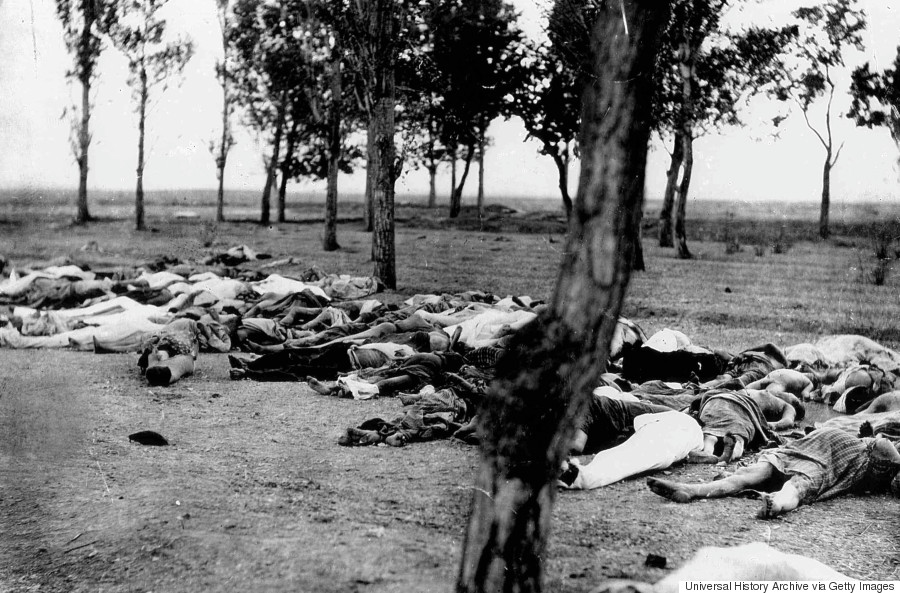Whatever the reasons, whatever the excuses, whatever the denials - its still a tragedy:
100 Years Ago, 1.5 Million Christian Armenians Were Systematically Killed. Today, It's Still Not A 'Genocide'
by fulltimestudent 10 Replies latest social current
-
-
paulmolark
since 'merica isn't directly involved you may get some non combatitive responses to this atrocity.
Its amazing that so many people have excuses for why the numbers are inflated or why it's not as bad as it may seem
-
truthseeker100
Of course it was tragedy full time. -
sowhatnow
its sickening the things people dont know about
-
Stirred
I did not know of this. Terrible! Yes, genocide. -
fiddler
It was from the website of Serj Tankian (of the band System of a Down) that brought my attention to this atrocity and yes...it WAS genocide. If you go to his website there is a haunting video called "100 Years".
I'd never heard of it in school history.
-
Jay Elle
I wish more attention was given to this genocide.
Even a few documentaries narrated by someone famous would help.
-
LoveUniHateExams
It's about time these deaths are recognised globally as a genocide.
The word 'tragedy' suggests that the Armenian deaths were unavoidable, as if the Young Turks somehow couldn't help themselves. The word 'atrocity' fits much better, IMO.
The fact that the slaughtered Armenians were Christian and the Young Turks were Muslim suggests that this was a religious genocide.
-
fulltimestudent
LoveUniHateExams : " ... as if the Young Turks somehow couldn't help themselves ..."
There are (of course) always multiple viewpoints. Trying to understand this tragedy is difficult. It can be argued that the Ottoman Empire had been multicultural (at least to an extent). The ethnic and religious tensions that underline contemporary difficulties in the area, were not necessarily problems that existed at that time. Ethnic and religious hatreds have become more involved, since the failed Versailles peace conference, after WW1.
The US based New Republic magazine published this review, of a recent book,** on the tragedy. Do you think it adds depth to an understanding of what happened?
GENOCIDE
APRIL 24, 2015
Let's Be Clear About What the Armenian Genocide Was—and Wasn't
Link: http://www.newrepublic.com/article/121626/armenian-genocide-was-about-nationalism-not-jihadAnd, for a sort of analysis of the Turkish viewpoint, this paper accessed through Academia.edu, may widen your viewpoint.
What is the Turkish position on the Armenian genocide? (June 2008)
Link: https://www.academia.edu/237643/What_is_the_Turkish_position_on_the_Armenian_genocide_June_2008_* *
Great Catastrophe: Armenians and Turks in the Shadow of Genocide Hardcover – February 2, 2015by Thomas de Waal (Author)In Great Catastrophe, the eminent scholar and reporter Thomas de Waal looks at the aftermath and politics of the Armenian Genocide and tells the story of recent efforts by courageous Armenians, Kurds, and Turks to come to terms with the disaster as Turkey enters a new post-Kemalist era. The story of what happened to the Armenians in 1915-16 is well-known. Here we are told the "history of the history" and the lesser-known story of what happened to Armenians, Kurds, and Turks in the century that followed. De Waal relates how different generations tackled the issue of the "Great Catastrophe" from the 1920s until the failure of the Protocols signed by independent Armenia and Turkey in 2010. Quarrels between diaspora Armenians supporting and opposing the Soviet Union broke into violence and culminated with the murder of an archbishop in 1933. The devising of the word "genocide," the growth of modern identity politics, and the 50th anniversary of the massacres re-energized a new generation of Armenians. In Turkey the issue was initially forgotten, only to return to the political agenda in the context of the Cold War and an outbreak of Armenian terrorism. More recently, Turkey has started to confront its taboos. In an astonishing revival of oral history, the descendants of tens of thousands of "Islamized Armenians," who have been in the shadows since 1915, have begun to reemerge and reclaim their identities.
-
FayeDunaway
A friend of mine is Armenian and always wearing tshirts about this genocide. 1.5 million, it is huge. Maybe most of the world was distracted with WWI at the time, it didn't receive the media attention it should have. It's time to recognize this as a genocide and remember all the people who were lost, innocent lives destroyed.
